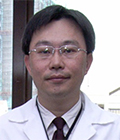 部主任/臺北榮民總醫院醫學研究部
部主任/臺北榮民總醫院醫學研究部
特聘教授/國立陽明交通大學藥理學科暨研究所
EDUCATION AND POSITIONS HELD:
- MD, School of Medicine, National Defense Medical College (1994)
- Resident Doctor/ Research Fellow, Department of Ophthalmology, Taipei Veterans General Hospital, Taiwan (1994-1999)
- Attending physician, Department of Ophthalmology, Taipei Veterans General Hospital, Taiwan (2000-present)
- PhD., Institute of Clinical Medicine, National Yang-Ming University (2002)
- PostDoc., City of Hope Hospital, Stem Cell /Bone Marrow Transplant Center, USA (2002)
- Visiting Scientist, Department of Molecular Biochemistry, The Scripps Research Institute, USA (2007)
- Professor, Institute of Pharmacology, National Yang-Ming University (2011)
- Section Chair, Division of Basic Research, Department of Medical Research, Taipei Veterans General Hospital, Taiwan (2013 to now)
HONORS:
- Section Chair, Division of Basic Research, Department of Medical Research, Taipei Veterans General Hospital, Taiwan (2013 to now)
- Young Investigator Award, Annual Meeting of Society of Molecular Imaging, Cologne, Germany (2005)
- Chairman/Keynote speaker, Cancer Stem Cell Section, 69th Annual Meeting, Japan Cancer Association (JCA), Osaka, Japan (2010)
- Outstanding Research Achievement Award, Taiwan Pharmacology Research Association, Taiwan (2012).
- 2nd Investigator Innovation Award, Taiwan Society for Biochemistry and Molecular Biology (2013)
- 9nd Lee-Tien Der Foundation Young Investigator Award, Taiwan (2014)
- Outstanding Research Award of Ministry of Science and Technology (MOST), Taiwan (2014)
RESEARCH INTERESTS:
(1) Cellular Reprogramming: Nuclear reprogramming induced by transcription factors is the resetting of epigenetic landmarks; it leads to the global reversion of the somatic epigenomes to an ESC-like state. We recently discovered that Parp1 and PARylation may act as the major regulator of reprogramming processes and maintenance of stem cell pluripotency, and these regulated networks were in part activated by endogenous c-Myc. Further studies on identifying the PARylation complex, Parp1-related posttranslational modifications, and it cellular functions during nuclear reprogramming, pluripotency, and tumorigenicity.
(2) Cancer Stem Cell: The involvement of stemness factors in cancer initiation and progression has drawn much attention. Our current study demsotnrated that miR142-3p directly targeted both IL-6 and HMGA2, inhibiting tumor-initiation property through suppressing the IL-6 paracrine loop and HMGA2/Sox2-stemness signaling. Further studies linking inflammatory cytokines with the epigenetic modification would reveal potential tumorous-autocrine/paracrine circuits and benefit to therapeutic development in malignant cancers, including glioblastoma.